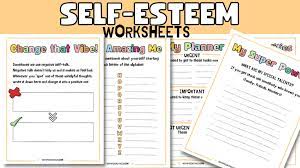1. Positive Affirmations: Encourage students to write down and repeat positive affirmations about themselves daily.
2. Gratitude Journal: Ask students to keep a journal where they can list three things they are grateful for each day.
3. Role-Modeling Exercise: Students identify role models in their lives and discuss the positive qualities they admire in them.
4. Group Compliments: In a group setting, students take turns complimenting one another on personal qualities or achievements.
5. Create a Vision Board: Have students create a vision board of their goals and dreams, using pictures and words that inspire them.
6. Volunteer Work: Coordinate with local organizations to give students opportunities to volunteer and help others.
7. Create an Achievement Box: Students make a box where they can store notes or mementos of their accomplishments.
8. Power Pose Activity: Teach students how to do power poses, which are body positions that can boost confidence and self-esteem.
9. Peer Support Groups: Establish peer support groups where students can share their experiences and learn from each other’s successes and mistakes.
10. Art Therapy: Use art projects as tools for exploring emotions and boosting self-esteem, such as creating self-portraits or painting emotion-based abstract pieces.
11. Public Speaking Practice: Encourage students to participate in public speaking events like debates or presentations to build public speaking confidence.
12. Set SMART Goals: Teach students how to set Specific, Measurable, Achievable, Relevant, and Time-Bound (SMART) goals for personal growth.
13. Mindfulness Exercises: Introduce mindfulness exercises like deep breathing or meditation techniques to help students develop self-awareness and emotional resilience.
14. Growth Mindset Teaching: Educate students on having a growth mindset – the idea that abilities can be developed through commitment and hard work rather than being innate traits.
15. Confidence-Boosting Games: Incorporate games and activities that promote self-confidence, such as competitive team-building activities or problem-solving challenges.
16. Celebrate Individuality: Create environment where individual talents are celebrated and respected, and students are encouraged to pursue their interests.
17. Positive Self-Talk Practice: Teach students to recognize negative self-talk and replace it with positive thoughts and beliefs.
18. Group Therapy Sessions: Offer group therapy sessions where students can talk about their emotions, challenges, and experiences in a safe and supportive environment.
19. Fitness Activities: Encourage physical fitness through group sports or exercise classes to help build confidence in students’ physical abilities.
20. Teacher-Student Mentorship Programs: Pair middle school students with teachers who can provide ongoing support, guidance, and encouragement for personal growth and overcoming challenges.





